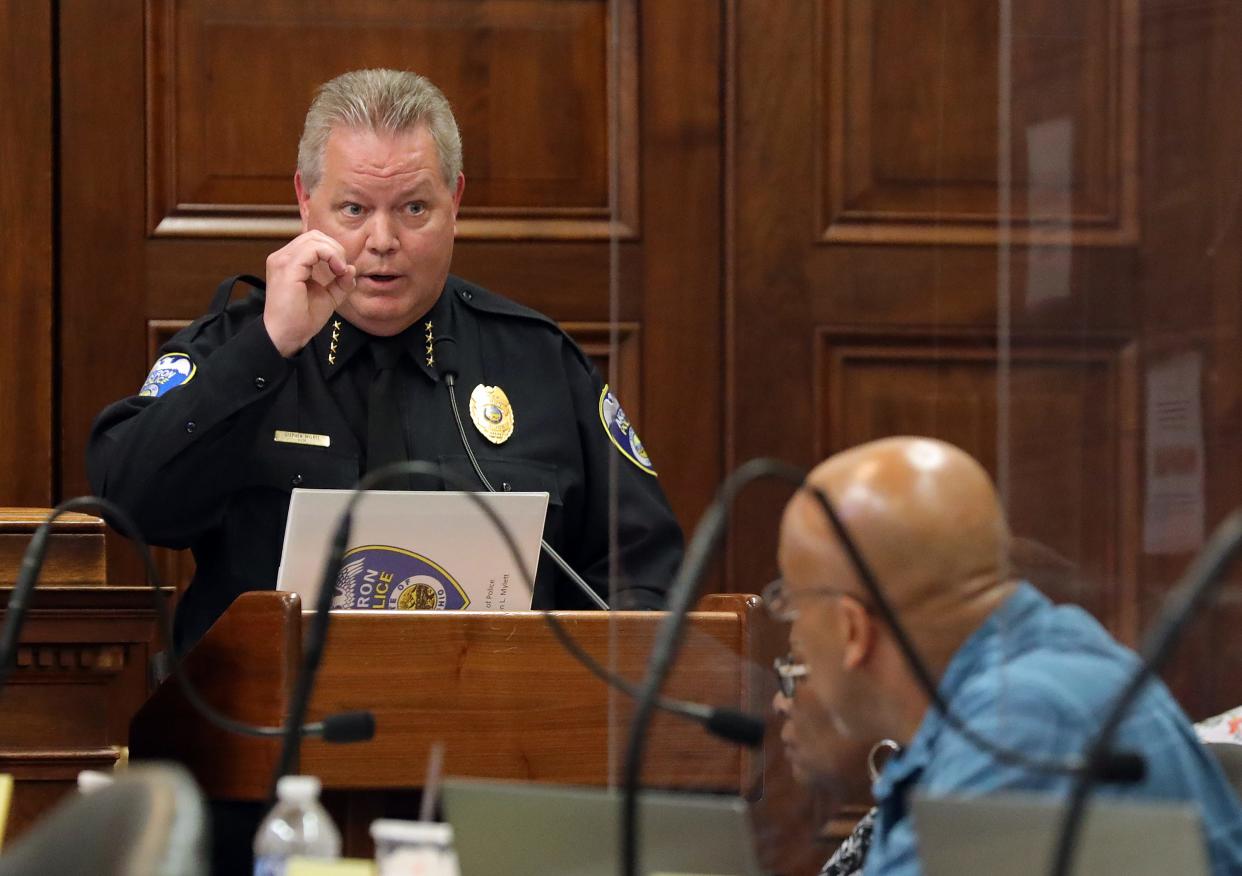Akron Police Chief Steve Mylett announces changes to pursuit policy, new co-responder program

Nearly a year after the officer killing of Jayland Walker sparked broad calls for reform, the Akron Police Department will make changes this month to its vehicle pursuit policy.
Akron Police Chief Steve Mylett told the new Citizens' Police Oversight Board Wednesday that he wasn't prepared to detail the change in department policy on when officers can and should chase vehicles, including those not involved in violent crimes.
“I’m not ready to tell this board what changes will be made because I need to tell my employees first,” Mylett said in his first appearance with the nine-member commission since it convened in April.
Walker, who was fatally shot 46 times, fled a June 27 traffic stop for a burnt-out taillight. The officer told dispatch that the stop had turned into a pursuit. Less than 30 seconds later, Walker fired a single shot from the window of his car, the officer called for backup and dozens of officers joined the crosstown pursuit.
Walker fled on foot and was shot and killed by officers, who said they thought he might still have a weapon. A gun was recovered after the shooting in Walker's car.
A special grand jury in Summit County Common Pleas Court recently decided against indicting the officers.
Walker's shooting led to calls for police reform, including the creation of the civilian review board.
But, in an interview Thursday, Mylett emphasized that the new police chase policy coming this month is not in response to the Walker case.
The current vehicle pursuit policy gives officers the discretion to decide whether engaging in a chase would be more dangerous to themselves and the public than the gravity of the crime allegedly committed by the driver. While 67% of Akron voters in a recent survey favored ending police car chases for non-violent crimes, Mylett said they are actually critical to fighting gun violence and 50% of pursuits are abandoned within two to three minutes.
"One of the reasons that we have not moved on adjusting our pursuit policy until now is the knowledge that there's a high enough percentage of the pursuits that result in the recovery of a firearm," Mylett said. "When I balanced that against the gun violence that we witness in the city, and the responsibility that the officers have been showing in canceling their own pursuits or supervisors canceling the pursuit, I decided to let the pursuit policy continue the way it was."
"But I've heard from members of the public, community leaders and officers about what their expectations are of us when engaging in a pursuit," said Mylett, who will brief Mayor Dan Horrigan about the pending changes expected later this month.
Chief announces plans for new co-responder program
Mylett also announced plans to launch a co-responder model that would send mental health professionals on calls with police. The concept, which is similar to how Akron police currently work with Community Support Services to render aid and services to mentally ill and homeless people, has been adopted in cities across the nation to put trained professionals in place to help officers de-escalate situations that can be handled with an unarmed response.
The city of Akron, led by former safety director Charles Brown, has been talking about using co-responders since before his arrival in July 2021, Mylett said. That year, Mylett left as chief of police in Bellevue, Washington, after starting a co-responder program there to address the homeless population in the Pacific Northwest.
The program, which was suggested by one of Mylett's officers, paired a trained mental health professional, often a graduate student with expertise and a need to complete course credit hours, and a plainclothes officer with "enhanced" crisis intervention training.
"The results were a 33% reduction in incarcerations for people in crisis, a 33% increase in placement of people in facilities, and the satisfaction level of the individuals that we were interacting with that was like 90 percent or higher," he said.
“We’re going to replicate something like that here, so long as we don’t have a mass exodus of officers,” he said.
The department is down 40 officers, Mylett said. Partnering on implementation will be the Akron Fire Department, Mylett said. Akron fire is also facing a staffing shortage and increased demand after it takes over all hospital transports Aug. 1 from a private ambulance company that is closing its Akron location.
Reach reporter Doug Livingston at dlivingston@thebeaconjournal.com or 330-996-3792.
This article originally appeared on Akron Beacon Journal: Akron police to tweak pursuit policy and add co-responders for 911 calls

